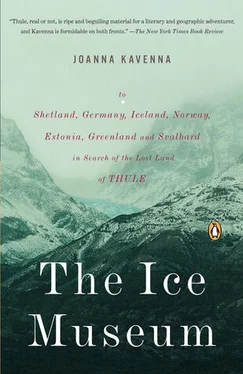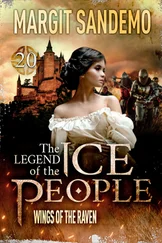We passed through this thicket of bergs, ice shapes moving slowly alongside the boat, like a convoy sailing us along the coast. After Ilulissat the tourists faded away, and the emptiness took over, drawing the ship further and further north. Brief stops on the shore increased the sense of distance. I would clamber ashore, onto a silent promontory, seeing the ship small against the mountains out at sea, and feel a sense of complete solitude. I would wander along a coast, my walks constantly curtailed by a jagged glacier, a frozen lake, or the spectral plains of the ice cap itself.
We stopped at an abandoned mine, a relic left on the shattered coast. The ship stopped, and everyone got off. We had travelled along a fjord for hours to arrive at the mine, which lay among vast grey mountains, with ice clambering down their sides. On one of the rocks was a patch of dark ore, shaped like a black angel, and beneath its right wing were two holes, gashed in the mountain high above the sea, with a sheer drop beneath. This was the entrance to a mine, long defunct. The workers had been winched each morning towards the black angel, like a scene in a melodrama. They descended in driving sleet winds into a black mine, and emerged later into the darkness of the winter days.
On the shore opposite the flying fury’s mountain were the remains of the mining settlement. There was a low wooden building, surrounded by white rocks layered in piles on the beach. Odd pieces of mining equipment were scattered around. Piles of concrete slabs, shattered bricks, twisted sheets of metal, a shoe, a sweater. Most of the buildings had been burned, but the barracks building had been left to rot. As I walked through the rooms—a small bedroom, a living room with a few chairs left strewn around, a bathroom—I trod on shards of glass. The place had been vandalized. The windows were shattered, the u-bends of the toilets were smashed; the wooden doors had been pummelled and thrown around. It looked as if the miners, who had once been trapped on this exposed piece of shoreline, had made a violent farewell, kicking in the doors of their former housing, smashing the furniture. But most likely, the destruction was the work of winter storms. It was a wreck, lurking under a weird-looking mountain, as the light faded.
The Aurora Borealis was moving so slowly along the coast there were days when I thought we had stopped altogether. It was more like a suspension of time than a voyage. The sea contained us; the land offered no escape, only the silence of the ice fields. The rocks changed colour with the changing tones of the sunlight—moving from vibrant purple to a rusty orange. I could sit on the deck for hours, watching the gradations of colour, and then there was the liquid metal of the ocean, boiling beneath the boat. After a few days, the boat was a seething torment of restlessness, as if the stillness of the view compelled us all to action. Rumours started to develop about other passengers: the two biologists who had fallen in love; the man who was troubled, but an artist; the Scottish sisters who were thinking of flying home at the next stop, except they couldn’t because there weren’t any flights. So they stayed on the ship, glowering through breakfast and disappearing for the rest of the day. Bumping into someone in a corridor by accident became a contest of regret, extended to pass the time. The boat resonated with symphonies of phoney concord, trilling up and down the decks. The sense of unease was critical, as if we were all fading into the view, vanishing into the vastness of the sky. It made us slightly raucous, struggling to keep a conversation going, as if to fall silent would be to disappear.
My neighbours at table were six German scientists. One of them walked with a limp, and he ate nothing but fruit. He wanted to live until he was 130, he told me. He already looked about 110. At first they were all friendly, jovial and welcoming, but after a few days they were bored of my German and wanted to trade puns together. They made their napkins into swans and talked about the weather. Soon they just wanted everyone else to vanish; they said they disliked queuing behind them for food, and passing them life-jackets and waiting while they fumbled for change at the bar. But they kept it up, toasting each other, greeting each other in the mornings like long-lost friends, treading on each other’s toes in the queues and then pretending it was all an accident.
We came to a small village, a few wooden houses set against a beautiful red mountain. A cluster of Greenlanders wearing jeans and sweatshirts wandered around. The continuous roar of drilling rose above the sounds of the street; a large wooden and concrete block was being built on the bog at the edge of the town. A light rain fell as I walked across the moss-rocks. I passed the building site, I walked cautiously around the piles of matted dog fur. A few builders were walking back to the village, Danes talking softly, dressed in fleece jackets. They were moving quickly, with a sense of energy and purpose; it highlighted something strange about the place. Everyone else seemed to be swaying as they walked. A gentle motion from side to side, as if they had just been on board a ship for a hundred days. Then I saw a fetid lake, and I turned a corner to find a local leaning drunkenly above a pile of his own vomit. He was staring deep into the vomit, pondering the void, and then with a great effort he swayed himself into a standing position and wiped his mouth. He fumbled in his pocket for a light for his cigarette.
Greenland was no longer a blank space. It was no longer a fantasy plain; the coasts were travelled, dotted with names. It made me think of Conrad: ‘It had ceased to be a blank space of delightful mystery. . . . It had become a place of darkness.’ The boat was ploughing a lonely course along the coast, and though the ice was beautiful from a distance, arresting in its whiteness, the realities of life in Greenland were stark. Vast tracts still lay untouched; the ice cap had never been crossed before Nansen took his skis to the white ridges. Greenland had defeated the Vikings altogether, though they struggled to live there for a few centuries. In the tenth century the Vikings had arrived, led by Erik the Red. Erik found there were animals for hunting—walrus, whales, reindeer—as well as fish, and fertile pastureland onshore. Erik sailed back to Iceland, with news of the fertile land beyond the ice sea. He called the land Greenland, in a conspicuous piece of euphemism, thinking an attractive name would make people sail there.
Erik took a fleet of boats back to Greenland, and others followed afterwards. Later Norsemen sailed from Greenland to the west, and recorded that they found a utopian land, called Vinland, where grapes grew abundantly. The clerics further south wrote up the new finds, merging their reports with old fantasies about the north. Adam of Bremen wrote that Greenland lay far out in the great Ocean, and that it was possible to sail to the island from the shore of Norway in five or seven days, as likewise to Iceland. The people in Greenland, wrote Adam, were bluish-green from the salt water, and this was how the country got its name. The Greenlandic Sagas written by the Vikings were equally fantastical, littered with echoes of myths and saint-voyages in the north. The indigenous populations they turned into Norse trolls, calling them Skræling , describing them as underground people with large staring eyes.
The Vikings struggled as the climate changed, and by the fifteenth century they had lost contact with the outside world. They disappeared; their settlements were abandoned. What happened to them remained mysterious—later arrivals found a few buildings, a few hunched skeletons, but nothing conclusive. They might have fallen into anarchy, fading into the perpetual darkness of the winter, losing the will to survive. They might have died of disease. They might have been murdered by the Inuit; they might have thrown in their lot with more successful tribes and become semi-Inuit themselves. No one knew for certain.
Читать дальше












